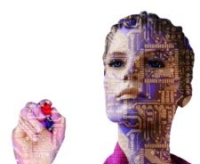By Rohit Talwar, Steve Wells, Alexandra Whittington, Maria Romero, and April Koury, from Fast Future Publishing
Here are nine that we believe will face the biggest upheavals in the next decade:
1. Investment analysts, fund managers and traders - investment bots will have the capacity to analyse ever larger volumes of current and historic trading data, news, company updates, and market sector information in a fraction of a second to make investment decisions.
2. Accountants - AI would enable real-time analysis of every transaction as it happens - thus reducing the potential for error and fraud and enabling a continuously updated set of accountants without human intervention. The ability to track and analyse every commercial and social interaction would create new opportunities for suitably skilled and reputable accountants who can leverage their trustworthiness and experience to become high-level business and financial advisors. The emphasis would be more on improving business results rather than collating and auditing them. In this role, the keys to a successful career would include understanding the evolving dynamics of a mixed business environment comprising machines and humans, the ability to spot and interpret complex emerging patterns, communication skills, and creativity.
3. Lawyers - a range of search, analysis, and contract drafting tasks are already being automated. The use of AI across sectors might challenge existing regulations and lead to a whole raft of new legal precedent work requiring expert input. However, the elimination of the potential for human error would decrease the number of legal disputes - as might be expected from the advent of self-driving cars reducing the number of human drivers. Robot-lawyers are already overturning parking tickets in the UK and US. Additionally, smart policing devices and an expanding blanket of sensors will feed into AI judges where there would be little to no room for debate. Moral and ethical issues related to technology advances may become the next legal growth arena.
4. Life coaches/therapists - Automation forecasts today are already causing anxiety and stress among perfectly healthy professionals. When mass layoffs start, society could see mental health issues rise to crisis level. Addressing these issues in timely manner, promoting coping mechanisms, and highlighting the importance of mental well-being for society would be fundamental priorities for life coaches and therapists. A growing number might choose to become coaches and therapists with disappearance of their former roles as lawyers, accountants, engineers, doctors, retailers, and taxi drivers.
5. Drivers / Mechanics - from taxis to buses, trucks and rescue services - humans seem likely to be eased out gradually from these roles as regulations allow autonomous / driverless vehicles onto the roads. These new "autonomous people moving units" can be designed around their primary purpose: moving people around on business, on leisure, and on holiday. They hold out the promise of being inherently safer, more fuel efficient and productive - freeing up drivers' time. They could also become self-diagnosing and connect with other vehicles to form self-insurance pools. The use of shape shifting 4D-printing techniques could also result in self-repairing vehicles.
6. Sales representatives - AI could become the personal shopper of the future - learning our desires and requirements and over time making purchases with less and less need to check in with us. Retail algorithms may offer recommendations drawing on vast databases of consumer preferences and our own shopping history and social media profiles. Shopping could become a task that no longer requires humans to allocate their precious time to do it. For those that still want a say in the process, it would be intertwined with other activities and may only take seconds to complete. For example, films and TV shows would offer the ability to click on an item being worn by an actor to order it. Self-driving devices and drones would then be able to deliver the purchase anytime and anywhere.
7. Entrepreneurs / Leaders - Instead of looking for human partners and employees, entrepreneurs might increasingly scout for the combination of AI systems that would match his/her personality profile and range of business needs better. One-person businesses could be more common as artificial general intelligence materializes - enabling the growth of fully automated Decentralised Autonomous Organisations (DAOs) which have literally no employees.
8. Research and development - from pharmaceuticals to new materials and electronic devices - AI software is increasingly being used to conduct more and more of the R&D value chain. The use of AI helps compress the iterative innovation process of trial-and-error experimentation. This involves doing more trials faster and comparing real-time data with historic and predictive consumer profiles to better target the solutions. Tailoring products and services using AI might lead organically to the creation of new and better offerings.
9. Customer service representatives - Chatbots are already making sales calls, helping customers make choices and solving callers' problems across a wide range of industries. No mood swings, standardized quality, 24/7 availability and extensive and constantly updated and up to date knowledge are just a few of the benefits that AI promises to bring to customer service. However, there might still be delicate and complex issues that would be handled better with a human touch.
In addition to these, there are numerous ways we might anticipate jobs could evolve in the future. Opportunities might arise in areas such as personal trainers, care of the elderly, the performing arts, helping older workers learn about the new and disruptive technologies and possibly teachers / classroom facilitators if greater emphasis is placed on developing life skills in smaller-sized, face-to-face classes.
The industries of the future will also generate a significant volume of mainly graduate or master's degree-level opportunities in everything from alternative energy and synthetic materials to human augmentation and driverless vehicles.
Ultimately, today's business leaders acknowledge that the robots are coming; it is just that we don't know for sure where they may have their biggest impacts.






